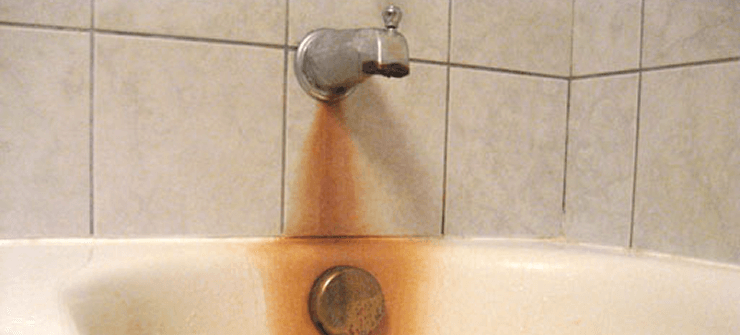Has your water suddenly turned orange? Don’t panic! We help homeowners with this exact problem every day, and it’s usually something we can fix. Let’s walk through why your water might be orange and what you can do about it.

Understanding Orange Water
The most common cause of orange water is iron. Think of it like tiny bits of rust floating around in your water. This often happens when your water comes from a well with iron-rich soil, or when old iron pipes start corroding in your home. Sometimes it can also be caused by a rusty water heater or even city water line repairs in your neighborhood. See for yourself here:
In some cases, what looks orange isn’t actually iron at all – it might be sediment. This could be tiny particles of clay or soil, especially if you’re on well water. City water users might see orange water when there’s construction nearby or when water mains are being repaired. These disturbances can stir up settled rust and minerals in the main water lines.
Finding the Source of the Problem
To figure out what’s causing your orange water, we need to do a bit of detective work. First, check if the problem only affects your hot water. If you’re only seeing orange water when you turn on the hot tap, your water heater is likely the culprit. On the other hand, if both hot and cold water are orange, the issue probably lies with your pipes or source water.
Another important clue is whether the water clears up after running for a while. If the orange color disappears after letting the water run for a few minutes, you’re probably dealing with rust that’s settled in your pipes overnight. However, if the water stays consistently orange, you might have an issue with your source water.
Simple Tests You Can Do at Home
One of the easiest ways to diagnose orange water is what we call the glass test. Fill a clear glass with water and let it sit for about an hour. If you see particles settling at the bottom, you’re dealing with sediment. If the water stays uniformly orange, you likely have dissolved iron in your water.
It’s also helpful to check multiple faucets around your home. Test taps upstairs and downstairs, and don’t forget to check your outside spigots. This can help you determine if the problem is isolated to one area or affecting your entire home.
Solving Orange Water Problems
Once you’ve identified the cause, you can move on to solutions. For iron problems, a water softener with an iron filter can work well if you have moderate iron levels. This combination approach not only tackles the iron but also helps with hard water issues. For higher iron levels, you might want to consider a dedicated iron filter, which is specifically designed to remove iron from your water like this can…Well water treatment by SoftPro
If you’re dealing with sediment, a whole-house filter system might be your best bet. These systems catch particles before they can make it to your faucets and help protect your appliances from damage. If you’re looking for a simpler solution, point-of-use filters installed at specific faucets can work well, especially for drinking water.
When to Get Professional Help
While many orange water issues can be diagnosed and even solved at home, sometimes you need expert help. If your water stays orange for more than a day, or if you notice other problems like low water pressure or strange smells, it’s time to call in a professional. Multiple affected faucets or sudden changes in water quality can also indicate a more serious problem that needs expert attention.
Preventing Future Problems
Prevention is often easier than cure when it comes to water quality issues. Regular maintenance can go a long way toward preventing orange water problems. We recommend flushing your water heater yearly and cleaning your faucet aerators regularly. If you have older plumbing, you might want to consider replacing old pipes before they start causing problems.
It’s also important to watch for early warning signs. Sometimes water will show slight tinting or develop a metallic taste before turning noticeably orange. You might also notice rusty residue around your drains or slight staining on fixtures. Catching these signs early can help you address problems before they become more serious.
Health and Cost Considerations
While orange water usually isn’t harmful to your health, it can certainly be a nuisance. Beyond the unappealing look and metallic taste, orange water can stain your laundry and damage appliances over time. The good news is that treating orange water doesn’t have to be extremely expensive. Start with simple solutions and work your way up to more comprehensive treatments if needed.
Taking Action
If you’re seeing orange water in your home, start by staying calm and running your taps for a few minutes. Document when the problem occurs and try the glass test we mentioned earlier. If the problem persists, don’t hesitate to reach out to water treatment professionals. These guys are very helpful: filter for iron removal. We’re here to help you understand what’s causing your orange water and find the best solution for your specific situation.
Remember, orange water is almost always fixable. Whether it’s caused by iron, sediment, or aging pipes, there’s a solution available. Need help figuring out what’s causing your orange water? Give us a call – we’re here to help you get back to clean, clear water!